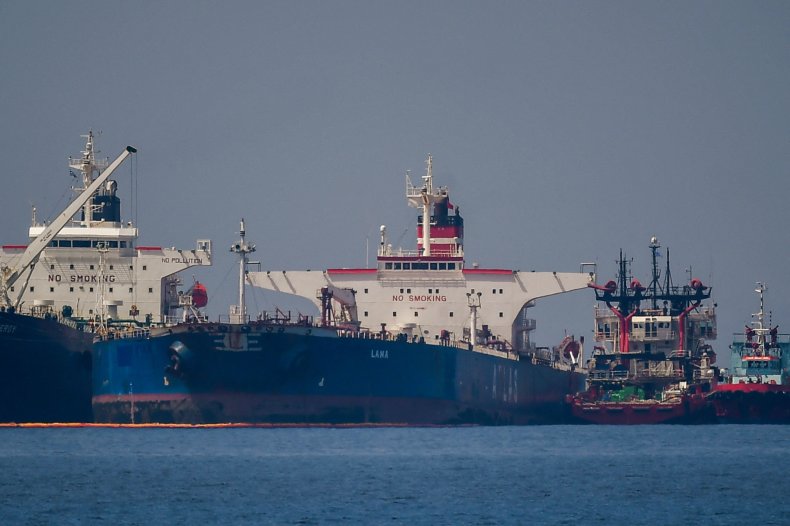The G7 group of advanced economies has delayed a long-awaited review of its price cap on exported Russian seaborne crude oil introduced in line with a European Union (EU) embargo in December and partially credited with the Kremlin's ballooning budget deficit.
Bloomberg first reported the delay on Monday, citing EU officials. European and Ukrainian sources confirmed to Newsweek on Tuesday that the review had been pushed back, with two officials suggesting that the U.S. was to blame. Newsweek has reached out to the U.S. State Department for comment.
The cap is currently set at $60 per barrel. Ukraine and some of the EU's more Russo-skeptic states want the cap to be cut to as low as $30 per barrel to minimize the Kremlin's lucrative oil income, which is helping fund its war in Ukraine.
"In general, they believe that price cap does its job," one diplomat from a Baltic state—who requested anonymity to speak candidly—told Newsweek of the American position. An official explanation of the American position is expected in the coming days, the diplomat said.

"The Americans want to get rid of the review mechanism as it takes too much effort for them to build the consensus between the two camps: us Balts and Poles, and those from the Mediterranean who transport the Russian crude and crude oil products," the official said.
Newsweek understands that U.S. negotiators initially appeared open to renegotiating the price cap if EU nations were prepared to abandon the periodic price cap reviews. But the U.S. later changed course and said a review was no longer desirable.
Driving the American position is an expected surge in oil consumption in the coming months. A lower price cap, the U.S. side fears, might destabilize the global market.
Southern EU nations have concerns about other effects.
"The general concern as I hear it from the Mediterranean countries is that if the price cap goes lower, the transportation business will go into the black market," the Baltic diplomat said.
The G7 measure prohibits companies from financial, transportation and insurance services for Russian crude oil and oil products if sold above the set price point. The figure is to be reviewed every two months, with the EU prescribing that the price should be at least 5 percent lower than average market rates.
Bloomberg reported that the weighted average export price of Russian crude was $52.48 per barrel as of this week, excluding shipping and insurance costs.
Advocates of revising the cap say that Russia will still sell its oil even at reduced prices, noting that Moscow continued to send its crude to market when prices were much lower than they are now. The $60 per barrel price cap has eaten into Russian profits without upending the market. Now, supporters of the cap review say, the West should turn the screws.
An Estonian diplomatic official—who requested anonymity as they were not authorized to speak publicly on the matter—told Newsweek of negotiations with the Americans: "Discussions definitely are not over yet. We want to be constructive and reason with them. I personally think it's not hopeless."
The official stressed the EU stipulation that the cap be reviewed every two months and recalled that U.S. Treasury Secretary Janet Yellen said in February that the price cap coalition was "committed" to re-evaluating the agreed price point in March.

Oleg Ustenko, an economic adviser to Ukrainian President Volodymyr Zelensky who is working on the oil cap issue, told Newsweek he does not believe the G7 delay means defeat.
"I have mixed feelings," he said from Kyiv. "Obviously, we want this review to happen right away, but at the same time we want the proper results [...] a significant downward movement in terms of the price cap."
Kyiv wants the new cap set at $30, Ustenko said.
"Some countries were saying that it should be at the level of around $50 per barrel, which is not acceptable for us," he added. "For us, it's better to continue discussions and to spend one more week, and then do these assessments and introduce a much lower price.
"Fifty would not make me happy, this is for sure. But if I have one extra week, this week will be used in order to make sure that we are going to much lower prices."
The Ukrainian side, Ustenko said, does not believe the U.S. is against cutting the price cap, but rather that it is delaying the decision to shore up consensus for a new price point.
The price cap appears to be working, even if there is not yet consensus on reducing it. The International Energy Agency said last month that Russia's revenues from oil and gas exports fell some 40 percent in January as a result of price caps and Western sanctions.
Dwindling fossil fuel incomes and higher military spending because of the war in Ukraine have created a stark Kremlin budget deficit, which in March rose to more than $34 billion.
This month, Kremlin spokesperson Dmitry Peskov denied that Russia was in financial difficulty, telling Newsweek: "The economy is stable, and the unprecedented sanctions not only failed to undermine it, but also did not cause a significant drop.
"Demand for Russian energy resources is growing. The Russian Federation is confident in its intention not to recognize any price ceiling and will not sell resources to countries that recognize those price caps."

"oil" - Google News
March 22, 2023 at 01:12AM
https://ift.tt/OncFgHM
U.S. Behind Delay in Review of G7 Russian Oil Price Cap: Officials - Newsweek
"oil" - Google News
https://ift.tt/0YIEuGw
Shoes Man Tutorial
Pos News Update
Meme Update
Korean Entertainment News
Japan News Update
Bagikan Berita Ini














0 Response to "U.S. Behind Delay in Review of G7 Russian Oil Price Cap: Officials - Newsweek"
Post a Comment